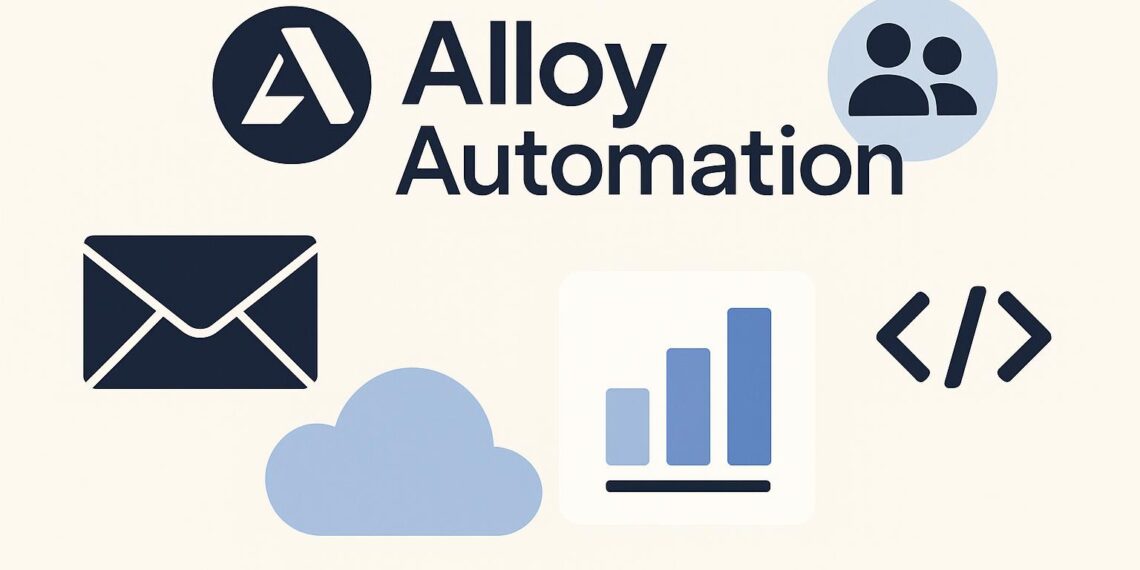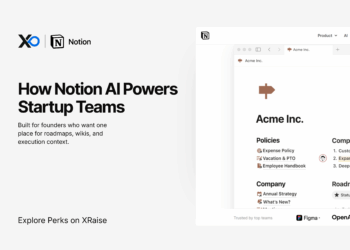Every founder has felt the integration pain: You’re juggling Shopify, Klaviyo, Gorgias, Slack—plus whatever secret sauce makes your stack tick. Critical data is siloed. Repetitive tasks suck away creative energy. Your team? Drowning in copy-paste, manual sync, and duct tape automations that break at the worst time—usually a launch or Black Friday.That’s where Alloy Automation steps in. It’s not just another “no-code” tool; it’s an integration and automation platform with startup DNA.
Whether you run an e-commerce brand fighting for every extra sale or a SaaS startup whose customers demand (and judge you by) seamless integrations, Alloy claims to be the connective layer your workflows deserve. In this founder-centric guide, we’ll unpack what Alloy actually does, how real startups use it, where it shines, the plan/pricing math, and where it might (or might not) fit your roadmap.
Alloy Automation Overview
Alloy Automation is a YC-backed integration platform founded by Sara Du and Gregg Mojica in 2019, right in the heart of the e-commerce workflow mess. At its core, Alloy connects your tools and automates your busywork—so your limited team can do more with less. It comes in two main flavors:
- Alloy Flow: A no-code/low-code automation engine built mostly for e-commerce and DTC brands who want Shopify-level automation with deep app connectors (think “Zapier, but actual e-comm obsessed”).
- Alloy Embedded: An embedded iPaaS for SaaS startups. Want your B2B product to offer dozens of sticky, native integrations without a year of engineering? Alloy Embedded promises marketplace UI, managed auth, and connectors galore, pluggable straight into your app.
What does this mean in startup reality? Less manual data entry, fewer “who’s got the latest spreadsheet?” crisis Slacks, more customer love, and (crucially) a shot at scalable ops without splurging on a giant dev team. If you’re a lean shop, or a SaaS founder where integrations are table stakes, Alloy might just save your launch (or sanity) 🚀🔗.

Key Features of Alloy Automation
Here’s what founders and early teams actually use (and care about):
🛠️ Visual Workflow Builder
Drag, drop, and connect: Build integrations across dozens of apps, map fields, and set up triggers/logic—no code required. Set up “if new Shopify order is >$500, tag as VIP in Gorgias, ping CX team in Slack, and trigger Klaviyo thank-you flow” in minutes.
📚 Huge E-commerce Connector Library
Native, deep integrations with Shopify, BigCommerce, Klaviyo, Gorgias, ReCharge, ShipBob, etc. These aren’t just HTTP hooks—they’re built for real e-comm/SaaS use cases. Manual API-wrangling? No thanks.
⚡ Prebuilt Automation Templates (“Recipes”)
Don’t want to start from scratch? Use Alloy automation ’s library of recipes for order sync, review management, marketing automations, or fulfillment updates. Great for inspiration, onboarding, and cutting launch time.
🧩 Conditional Logic & Data Transformations
Not just “IF this, THEN that”—build logic branches, add delays, loop through order line items, transform data formats, and more. Lets founders automate real-world, not cookie-cutter, processes.
🧑💻 Custom Code Blocks (JavaScript)
For when you do have technical chops, you can drop in custom JS to solve weird edge cases or do API calls beyond the vanilla connector set.
👁️ Real-time Monitoring & Workflow Logs
See every run, error, and data hand-off. Debug without guesswork (and breathe easy knowing where things break).
✨ Alloy Automation Embedded: White-label Integration Marketplace
SaaS teams get an embeddable, branded “Integrations” UI—plus managed auth, sync health, and observability. Much easier than rolling your own, and lets you go-to-market with integrations faster.
🔗 Unified APIs (for certain categories)
For supported apps (e.g., commerce platforms), build to Alloy’s standardized API once, and cover Shopify, BigCommerce, Wix, etc.—no need for one-off integrations.
Alloy Automation Pros and Cons
The real founder’s scorecard:
👍 Pros
- Super startup-friendly: Easy to use for non-technical teams
- Battle-tested for e-commerce: Deep Shopify/DTC integrations out of the box
- Major time/labor savings: Automate what wastes your day
- Fast go-to-market: SaaS teams launch integrations natively (no Zapier handoff)
- Scales with you: From free tier to enterprise volumes
- Freemium/accessible entry point for bootstrappers
👎 Cons
- Can get pricey fast with transaction/usage scale
- Some connectors or advanced logic require higher tiers
- Learning curve for really custom flows or Embedded SDK
- Slight “black box” debugging pain when things break
- Risk of vendor lock-in if you base your whole integration strategy on Alloy automation Embedded
- If your app isn’t in their library, custom connectors = more work
Considering for Startups
Choosing Alloy automation comes down to where you’re at, and what you really need. Here’s your quick “Should we?” gut-check:
📊 What’s your core integration headache?
Manual data sync? Sluggish ops? Customer requests for integrations? Identify your “hair on fire” ops or product problem first.
💰 Is budget a gating factor?
Alloy Flow starts free, but costs scale with task volume. Alloy Embedded is more investment upfront ($500+/mo), so funded/mission-critical SaaS teams benefit most.
🔗 How ‘plug-and-play’ do you need?
Need deep Shopify/Shopify Plus, Klaviyo, ReCharge… or super-niche SaaS X to SaaS Y? Check the connector library—Alloy Automation rocks for mainstream e-comm, less so for long-tail tools.
⚙️ How technical is your team?
Founders-only with no devs? Alloy Flow shines. Have some eng capacity? Alloy Embedded and custom JS open up real power, but count the developer hours.
📈 Will volume spike soon?
Launching on Product Hunt or prepping for peak season? Know your projected order/task volume, since overages flip your cost structure fast.
🦾 Do you want integrations as a differentiator?
If you’re a SaaS startup, do native integrations sell your product? Alloy Embedded gets you there faster, but you’ll want buy-in across product + eng.
🏗️ Are you building a forever stack, or an MVP?
If you just need to hack together a functioning workflow to survive pre-seed, Alloy’s free tier is ideal. Migrating away can become work later, so plan ahead.
Alloy Automation Plans and Pricing
Here’s what Alloy’s pricing looks like as of 2024 (actuals: always check their site for official changes):
| Plan | Monthly Price (Annually Billed) | Usage Limit | Key Features |
|---|---|---|---|
| Free | $0 | ~1,000 tasks/month | Basic connectors, up to 3 workflows, limited support |
| Starter | $49 – $99 | ~5,000–10,000 tasks | More connectors, increased workflows, email support |
| Growth/Pro | $199 – $499 | ~25,000–100,000 tasks | Premium connectors, advanced logic, priority support |
| Enterprise | Custom (starts ~$1,500/mo) | Custom/high-volume | Unlimited workflows, dedicated CSM, custom SLAs |
Alloy Automation Embedded: typically $500–$1,500+/month, depending on # of integrated customers, features, and support. No instant checkout—you’ll talk to sales.
Startup tips:
- Free plans get you to MVP, paid plans scale rapidly after you find traction.
- Watch for task overages. If workflows run “all day, every day” across tons of orders/events, plan for higher costs.
- Embedded plans start at serious B2B pricing—see if you can get pilot/moonlighting discounts.
Alloy Automation Startup Discount and Promo Info
Updating
Comparing Alloy Automation with Alternatives
Several solid players, but not all are optimized for lean e-comm or SaaS use:
| 🧩 Feature | Alloy Automation | Zapier | Paragon (Embedded) |
|---|---|---|---|
| 🎁 Free tier | Yes (~1,000 tasks/mo) | Yes (100 tasks/mo) | No, but pilot discounts |
| ⚡ E-comm connectors | Best-in-class (Shopify+) | Good, broad | Good for SaaS, less e-comm |
| 🛠️ Visual builder | Yes, drag & drop + JS | Yes | Yes (embedded builder) |
| 🔌 Unified API | For select categories | No | No |
| 💸 Startup pricing | Free/low for Flow, custom | Low for Zapier, | From $500/mo+ |
| for Embedded | Embedded not native | ||
| 👩💻 White-label | Embedded only | No | Yes |
| 🎯 Best for | E-comm ops, SaaS GTM | General SMB, non-tech | SaaS selling integrations |
Summary:
- Alloy Automation: Best e-comm workflow depth, SaaS embedding.
- Zapier: Easiest SMB starter, most app breadth, lacks deep commerce power.
- Paragon: Strong for SaaS integration marketplaces, pricier, better for general B2B SaaS than DTC brands.

FAQs
❓ Is Alloy beginner-friendly?
Yes, the Flow builder is genuinely accessible—non-technical founders routinely automate entire ops setups.
❓ What are the hidden costs?
Task overages (on Flow) add up fast with high-volume stores. For Embedded, scaling past user tiers gets expensive. Always check usage and upgrade triggers.
❓ Can I integrate with any app?
Core e-commerce/SaaS apps are covered. Uncommon tools may require custom connectors—possible, but dev time required.
❓ How fast can I launch with Alloy Flow?
A day or less for basic workflows—prebuilt recipes are a huge time-saver for small teams.
❓ Is Alloy Embedded self-serve/free trial?
Not really. You’ll need a sales/demo call, some dev time, and probably pilot pricing. Expect onboarding handholding.
❓ Do I need a developer to get max value?
For Alloy Flow—mostly no. For hugely custom automations or Alloy Embedded’s SDK/integration builder—yes, at least part-time.
❓ Is there vendor lock-in?
Some—once your stack runs dozens of key automations in Alloy, migration gets non-trivial (true of all iPaaS players).
❓ How’s support?
Generally solid and startup-aware, with higher plans getting faster, more hands-on responses.
Final Thoughts
Alloy Automation is a legit force multiplier for startups—especially those knee-deep in e-commerce ops, or SaaS teams where integrations drive revenue and retention. Its free/affordable tiers make it a no-brainer for testing automations, and its Embedded platform solves what used to be a “hire two backend devs for 6 months” problem. 🧑🚀
But, like any power tool, it’s sharpest when your pains are around manual processes, missing connections, or integration build-out. Watch your task volumes and connector requirements—cost and complexity scale with you. If you’re a SaaS team just figuring out product-market fit, only jump into Embedded if native integrations really drive signups in your vertical.
Not totally sure? Play with the free plan, wire up a workflow (or three), and if you love it, double down. If Alloy Automation doesn’t fit, Zapier’s still a great “get it done today” choice, and for B2B SaaS, explore Paragon, Tray, or Cyclr.
Whatever path you take, automate early, automate smart—and reserve your founder hustle for what actually moves the needle. 🚀✨










